MercoPress. South Atlantic News Agency
Economy
-
Tuesday, April 12th 2016 - 09:00 UTC
Don’t Blame Panama. Tax Evasion Is a Global Problem.
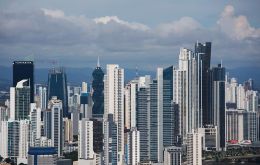
By Juan Carlos Varela (*) - The following was published by The New York Times in The Opinion Pages. DESPITE their name, the Panama Papers are not mainly about Panama. They are not even primarily concerned with Panamanian companies. The more than 11 million documents, illegally hacked and released last week relating to previously undisclosed “offshore” corporations, is roiling the world with revelations of the vulnerability for rampant abuse of legal financial structures by the wealthy.
-
Monday, April 11th 2016 - 06:05 UTC
ECLAC anticipates minus 1.9% contraction in economic activity this year in South America

Latin America and the Caribbean are forecast to have an average economic activity contraction of -0.6% during 2016, according to the latest release from the Economic Commission for Latin America and the Caribbean (ECLAC). This new estimate reflects that the contraction experienced by regional Gross Domestic Product (GDP) in 2015 (-0.5%) will extend to the current year.
-
Monday, April 11th 2016 - 05:46 UTC
Argentina ready to formally join the IMF fold; Prat-Gay to meet Lagarde this week
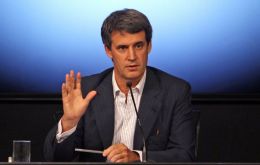
Argentina will start discussions with the International Monetary Fund (IMF) this week on its first Article IV review in a decade, Finance Minister Alfonso Prat Gay said at a conference held by the Institute of International Finance (IIF) in Nassau. “Next week we are going to have a discussion (with the IMF) to agree on an actual schedule for the next Article IV evaluation, which will happen sometime around September,” Prat Gay told the audience on Sunday.
-
Saturday, April 9th 2016 - 16:39 UTC
Argentina begins next Monday road-show in UK and US to raise US$ 15bn

Argentine representatives will begin meeting investors Monday as the country returns to the international bond market for the first time in 15 years, it was announced by Economy minister Alfonso Prat-Gay from Bahamas, where he is attending the Inter American Bank annual assembly.
-
Saturday, April 9th 2016 - 16:13 UTC
EU and Mercosur agree to exchange market access offers in second week of May
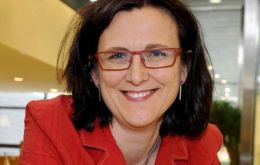
The European Union Trade Commissioner Cecilia Malmström and Rodolfo Nin Novoa, Foreign Minister of Uruguay, which currently holds the rotating presidency of the South American trading bloc Mercosur, agreed on Friday in Brussels on the next steps in the negotiations on an EU-Mercosur trade agreement.
-
Saturday, April 9th 2016 - 14:59 UTC
Panama Papers: EU warning; questions why no US or German prominent names have surfaced
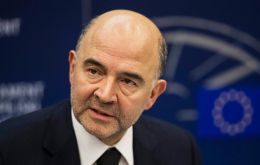
A European Union official threatened to sanction Panama and other nations if they don’t cooperate fully to fight money laundering and tax evasion, after a leak of data showed the small country remains a key destination for people who want to hide money.
-
Friday, April 8th 2016 - 07:28 UTC
Uruguay in Brussels to begin a crucial round of Mercosur/EU negotiations

Uruguay Foreign Minister Rodolfo Nin Novoa is scheduled to begin this Friday in Brussels what is believed to be the last round of talks with the European Union to reach a wide ranging cooperation and trade agreement between Mercosur and the European Union.
-
Friday, April 8th 2016 - 07:12 UTC
Irish beef farmers strongly reject accord with Mercosur; protest letter to Trade Commissioner Malmstrom
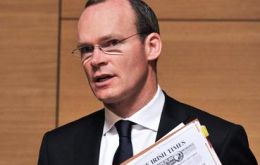
The Irish Farmers' Association has described an European Union offer to allow limited access to the EU market for Mercosur beef producers as “unfair”. The offer, which includes beef producers in Brazil, Uruguay and Argentina, is about to be presented to European Union member states for discussion, ahead of a proposed formal exchange of offers as part of the EU-Mercosur trade negotiations in May.
-
Friday, April 8th 2016 - 07:04 UTC
FAO Food Price Index in March: sugar up, dairy products down and meats stable
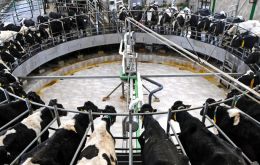
The FAO Food Price Index for March rose by 1.0% compared to February, as soaring sugar prices and continued increase in palm oil quotations more than offset plunging dairy product prices. The Index averaged 151.0 points in March, its highest level in 2016, but still some 12.0% below its level of a year earlier.
-
Friday, April 8th 2016 - 06:58 UTC
Large inventories and sluggish demand for 2016/17 global cereal production predicts FAO

World cereal production in 2016 is set to amount to 2 521 million tons, just 0.2% off last year's large output and the third-highest global performance on record, according to FAO's first forecast for the new season, released on Thursday. Large inventory levels and relatively sluggish global demand mean that market conditions for staple food grains appear stable for at least another season, the agency's latest Cereal Supply and Demand Brief predicts.
